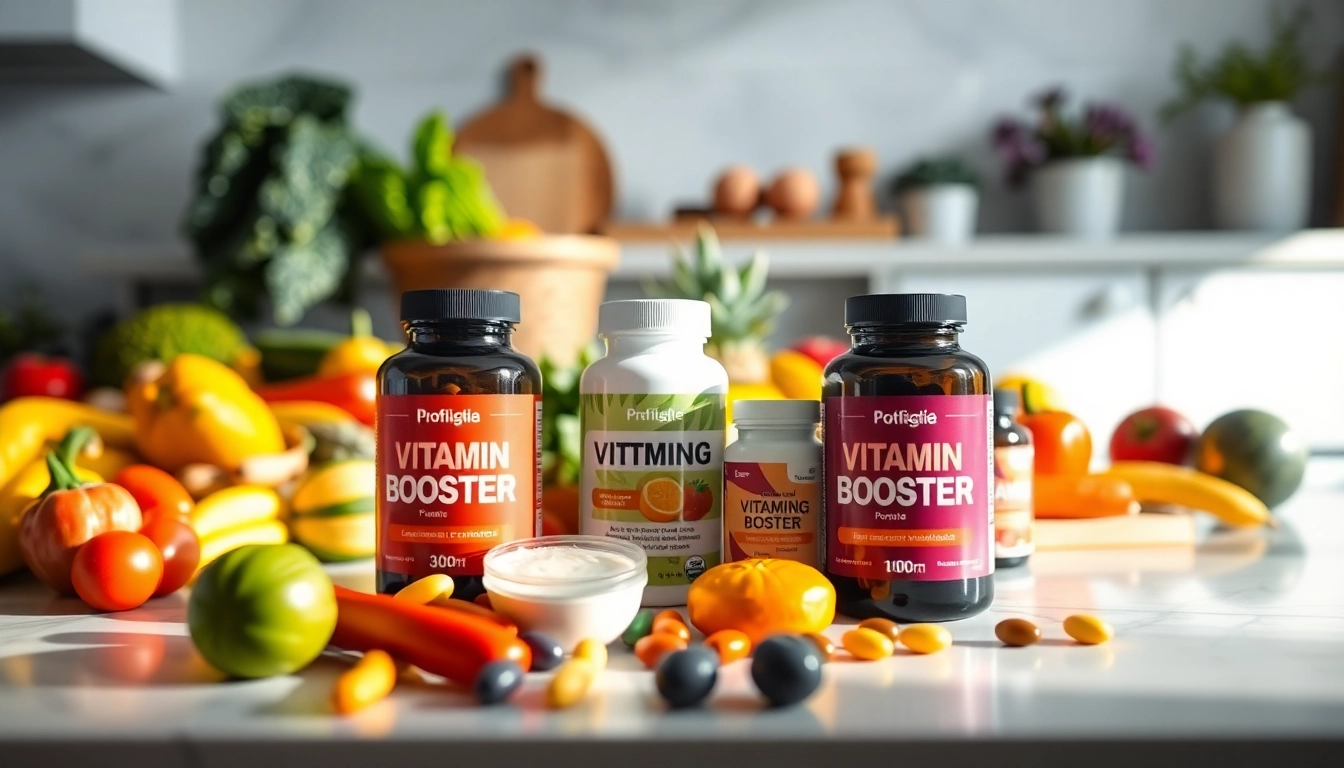The Benefits of Vitamin Boosters
Understanding Vitamin Boosters
In an age where health and wellness are at the forefront of our daily lives, many individuals seek ways to enhance their overall well-being. One strategy that has emerged is the use of Vitamin Boosters. These boosters come in various forms, including supplements, foods, and specially formulated drinks, designed to deliver essential vitamins directly to our bodies in a concentrated format. But what exactly are vitamin boosters, and how do they work? Vitamin boosters are concentrated sources of vitamins, primarily providing elements our bodies may lack due to dietary restrictions, lifestyle choices, or health conditions. They can be derived from natural sources or synthesized in laboratories, specifically targeting specific nutritional deficits.
How Vitamin Boosters Support Overall Health
Many people underestimate the critical roles that vitamins play in maintaining good health. They are essential for various bodily functions, including immune system support, cognitive function, energy production, and neurological health. The addition of vitamin boosters helps to fill potential gaps in dietary intake caused by non-ideal eating habits. For instance, individuals with restricted diets—such as vegans or those with allergies—might find it challenging to receive adequate amounts of essential vitamins solely from food. In such cases, vitamin boosters can be beneficial, ensuring nutrient levels are adequately supported without compromising dietary choices.
Popular Vitamin Boosters and Their Effects
Some of the most commonly sought-after vitamin boosters include:
- Vitamin C: Known for its immune-boosting properties, Vitamin C plays a vital role in the growth and repair of tissues, and it can improve skin health by combating free radicals.
- Vitamin D: Often dubbed the “sunshine vitamin,” Vitamin D is crucial for calcium absorption, leading to stronger bones and improved immune function.
- Zinc: This mineral aids in immune system function and has been shown to shorten the duration of colds.
- Vitamin B Complex: A collection of vitamins that support metabolic health and energy levels, the B vitamins are integral to overall well-being.
- Vitamin E: An antioxidant that assists in protecting cells from oxidative stress, thereby promoting skin health and reducing inflammation.
Choosing the Right Vitamin Boosters
Assessing Your Nutritional Needs
When considering vitamin boosters, it is essential to start with an assessment of your personal nutritional needs. This process typically involves reflecting on your dietary habits, potential deficiencies, lifestyle factors, and health goals. An individual who follows a balanced diet may require fewer additional boosters than someone who frequently skips meals or consumes processed foods.
Additionally, understanding specific genetic factors, such as those related to nutrient absorption, can help inform which vitamin boosters may be beneficial. Not all vitamin boosters suit every individual; hence personal analysis is critical for optimal results.
Consulting with Health Professionals
To navigate the myriad of available supplements and boosters effectively, consulting with a healthcare professional is advisable. They can provide insights tailored to your unique health profile, helping you avoid unnecessary or potentially harmful additions to your routine. A registered dietitian, for instance, can guide supplement selection based on dietary preferences, restrictions, and specific health concerns following an in-depth analysis of your current diet and health status.
Identifying Quality Sources
The market is flooded with various vitamin boosters, making it imperative to identify high-quality products. It is wise to look for brands that prioritize transparency, sourcing organic ingredients, and safety measures like third-party testing. Reviewing certifications from bodies such as the FDA or NSF International can also assure consumers of a product’s safety and efficacy.
Home Remedies vs. Vitamin Boosters
Natural Food Sources of Vitamins
While vitamin boosters offer concentrated doses of essential nutrients, obtaining vitamins from natural food sources is often the most beneficial approach. Whole foods are typically nutrient-dense and unprocessed, offering a diverse array of vitamins, minerals, fiber, and antioxidants. Foods such as fruits, vegetables, nuts, seeds, grains, and legumes are excellent choices for deriving vitamins naturally. They also come packed with additional compounds that can enhance absorption and bioavailability, which may not always be present in supplement form.
When to Consider Supplements
Even with access to a balanced diet, there are instances when vitamin boosting supplements are warranted. These situations include but are not limited to:
- Diagnosed deficiencies based on medical testing
- Dietary restrictions that impede adequate nutrient intake
- Increased physical activity or stress, which can elevate nutrient requirements
- Aging, which can impede nutrient absorption
Recognizing these conditions can assist individuals in determining when to supplement alongside their dietary intake.
Potential Risks of Overuse
While vitamin boosters can provide many benefits, it is crucial to handle dosage with care. Overusing vitamin supplements can lead to toxicity and adverse health effects. For instance, excessive Vitamin A can cause dizziness, nausea, and even liver damage. Likewise, excessive Vitamin E can affect blood clotting, leading to increased bleeding risks. It is fundamental to adhere to recommended dosages and consult healthcare professionals when introducing new supplements to your routine to mitigate these risks.
Incorporating Vitamin Boosters into Your Routine
Creative Ways to Add Boosters to Meals
Adding vitamin boosters to your diet doesn’t have to be a daunting task. There are numerous creative ways to incorporate them into meals:
- Smoothies: Blend a variety of fruits and vegetables along with a scoop of powdered vitamin boosters for a delicious nutrient-rich drink.
- Soups: Stir in vitamin-rich powders or extract pastes, allowing them to enhance flavors while bolstering nutritional content.
- Baking: Add vitamin booster powders to homemade baked goods, providing an extra nutrient punch in muffins or pancakes.
- Salads: Top salads with nuts and seeds rich in vitamins or sprinkle powdered boosters over your favorite dressings.
Best Times to Take Vitamin Boosters
The effectiveness of vitamin boosters can sometimes depend on timing. Proper scheduling can enhance their efficacy. For example, B vitamins, known for promoting energy, may be best taken in the morning to align with daily activity, while fat-soluble vitamins such as Vitamins A, D, E, and K should be taken with meals containing fats for optimal absorption. Consulting with health professionals can offer personalized guidance based on individual circumstances.
Monitoring Your Progress
Incorporating vitamin boosters is only part of the equation; tracking your progress is crucial. Keep a journal to record any changes in energy levels, mood, skin health, or overall vitality. Regular check-ins with healthcare professionals allow for adjustments, ensuring continued alignment with health goals and addressing any potential adverse effects promptly. By being proactive in this manner, individuals can maximize the benefits derived from vitamin boosters.
Future Trends in Vitamin Boosters
Emerging Research on Vitamin Efficacy
The landscape of nutrition continues to evolve, with ongoing research focusing on vitamin efficacy and optimal dosages. As more studies emerge, insights into specific vitamin interactions and their influence on health conditions can guide smarter choices regarding supplementation. Additionally, the growing interest in personalized nutrition is paving the way for tailored vitamin booster solutions, ensuring individuals receive precisely what they need based on their unique biological makeup.
Innovative Product Developments
The market is likely to see innovative products that integrate novel forms of delivery systems for vitamins. Enhanced bioavailability and absorption technologies in formulations could ensure higher efficacy in boosting nutrient levels. For example, microencapsulation technologies may offer more stable and effective delivery of sensitive nutrients. This trend toward innovation signifies the need for consumers to stay informed about advancements and select products that leverage such technologies.
Consumer Awareness and Education
As consumers become more health-conscious, the demand for knowledge regarding vitamin boosters will continue to escalate. Educational initiatives focusing on vitamin science and the role of nutrition in health will empower individuals to make informed choices. Moreover, healthcare professionals will likely play a key role in advising patients about effective supplementation, guiding them toward reputable sources of information for decision-making. By prioritizing education, more individuals can understand not only why they take vitamin boosters but how to use them effectively for better health outcomes.



